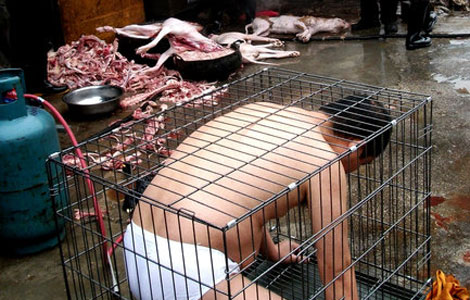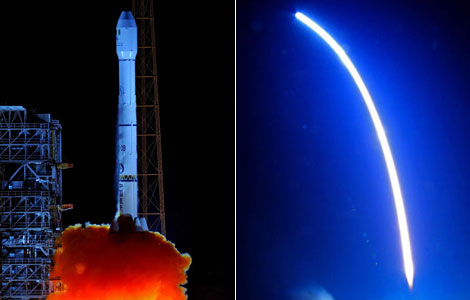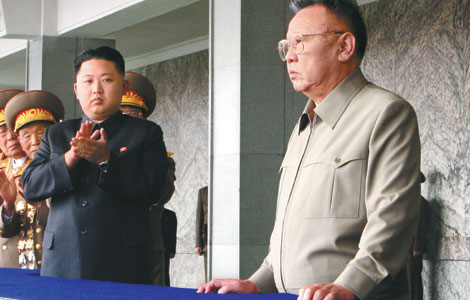Fears for political crisis emerge in Iraq
Updated: 2011-12-20 16:38
(Xinhua)
|
|||||||||||
BAGHDAD - Tension among Iraq's major political blocs has been rising, as the country's highest judiciary body issued an arrest warrant for Vice President Tariq al-Hashimi on terror charges Monday.
Interior Ministry spokesman Major General Adel Daham told a press conference that "the judiciary panel (formed by the council) of five judges issued an arrest warrant for the vice president of the Republic."
The spokesman said the warrant was issued based on the Article Four of the country's anti-terrorism law, without giving a timeframe for the implementation.
The Interior Ministry, at the press conference, presented the confessions of three detained suspects, including two of Hashimi's security guards, noting that they carried out several terror operations with the knowledge of Hashemi or under his command.
Earlier on Monday, the Supreme Judicial Council reportedly banned the vice president from travelling abroad.
The issue of the arrest warrant against the vice president marked a new height of the political wrangle between Iraqi Prime Minister Nouri al-Maliki and his major rival bloc al-Iraqia.
Maliki asked the National Assembly to withdraw confidence from his Sunni deputy Salih al-Mutlak on Sunday, after the latter described Maliki as "a dictator."
Mutlak dubbed Maliki "a dictator" in an interview with CNN, and on anther occasion told his own satellite TV channel of Babiliyah that "Maliki is worse than Saddam Hussein."
The deputy prime minister, one of the leading figures of al- Iraqia, blast out the remarks following Iraqi military forces detained several security staffs working for Vice President Tariq al-Hashimi.
Hashimi, another high-profile member of al-Iraqia, was earlier alleged of involvement in a car bombing attack near the National Assembly building inside Baghdad's Green Zone in November.
The attack, leading to the injury of a parliamentary member, was assumed by Maliki as targeting him.
On Saturday, the Sunni-backed parliamentary bloc of al-Iraqia, headed by former prime minister Ayad Allawi, boycotted the parliamentary sessions, demanding reforms and protesting "the unilateralism" by Maliki.
The protest was believed by many analysts here as a response to Maliki's legal action against Hashimi.
The reason of the boycott is to end Maliki's course in ruling the country, spokesman of the al-Iraqia Haider al-Mulla told media.
"Al-Iraqia insists to reform the political process to end the current status of growing approach of unilateralism by Maliki and his marginalization efforts against political partners," said the spokesman.
On Saturday, the National Assembly held a session with an attendance of 184 lawmakers of the parliament's 325 members without the presence of al-Iraqia lawmakers.
These latest moves show the growing struggle between Allawi's bloc and Maliki's leading Shiite bloc, as the US troops concluded their withdrawal plan Sunday, leaving less than 200 personnel in the country on training mission.
Allawi was the prime minister in the transitional government from 2004 to 2005. His Sunni-backed al-Iraqia bloc was the winner in 2010 polls with 91 seats, just two seats more than Maliki's State of Law bloc.
Under an informal power-sharing deal agreed on by the two groups, Maliki secured the prime minister post after the 2010 election.
However, Maliki's Shiite-dominated government enraged his rival parties, which could trigger a potential political crisis in the post-occupation era.
Tussle over political power and territory is believed by many analysts as the major danger which Iraq is faced with after the US troop pullout. The issue of the arrest warrant against the country's vice president could possibly be a prelude of a lasting political strife in the war-battered country.
Al-Iraqia has so far made no comment on the arrest warrant.
- Hu expresses condolences on Kim Jong-il's death
- Japan detains Chinese fishing captain
- Man charged in consulate shooting
- Trial continues for soccer corruption
- Malnutrition endangers children
- Urban residents outnumber farmers
- Analysts: Kim's death to have 'limited impact'
- Soccer corruption trials kick off
Hot Topics
HIV/AIDS, Egypt protest, Thanksgiving, climate change, global economic recovery, home prices, high-speed railways, school bus safety, Libya situation, Weekly photos
Editor's Picks

|

|

|

|

|

|







